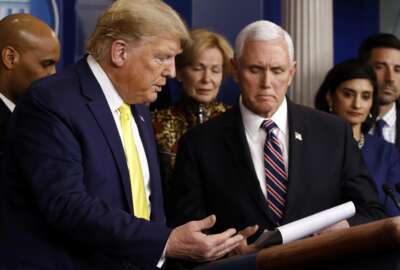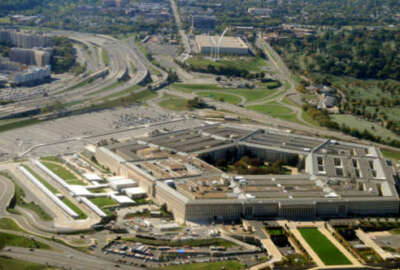
OPM asks federal health insurance providers to make adjustments to prepare for coronavirus
To listen to the Federal Newscast on your phone or mobile device, subscribe in PodcastOne or Apple Podcasts. The best listening experience on desktop can be...
To listen to the Federal Newscast on your phone or mobile device, subscribe in PodcastOne or Apple Podcasts. The best listening experience on desktop can be found using Chrome, Firefox or Safari.
- The Office of Personnel Management wants federal health insurance providers to make sure they’re ready for COVID-19. OPM urged Federal Employee Health Benefits carriers to ease up on typical cost sharing requirements for coronavirus testing and telehealth visits. They should also consider waiving fees or reimbursing participants for medical care, ambulance transportation and other costs associated with coronavirus treatment. At least one FEHB carrier has already said it will waive cost sharing requirements for COVID-19. The Blue Cross and Blue Shield Federal Program announced its plans last week. (Office of Personnel Management)
- Federal offices in the national capital region are open today but with maximum telework flexibilities. The Office of Management and Budget asked agencies to offer telework to all eligible employees in the DC area. It’s still up to each agency to order employees to telework or not. The Office of Personnel Management says employees should ask their supervisors for their telework schedules. It’s the strongest language the Trump administration has offered yet in response to the coronavirus. (Federal News Network)
- One agency is making some changes to its controversial telework policy amid growing coronavirus concerns. The Social Security Administration said it’ll revert back to its original telework policy for most components. It’ll also offer a work-from-home quarantine option for employees who are quarantined or have children home due to a coronavirus school closure. But SSA employees and unions say the agency’s new policy doesn’t go nearly far enough. Employees who work in high-traffic fields and regional hearings or customer service offices still can’t telework. (Federal News Network)
- The Education Department is relaxing limits on how often employees can work from home to prevent the spread of the coronavirus. In an all-staff email Friday, the agency authorized unscheduled telework and leave through April 10 for high-risk employees. Those include older employees, employees with serious chronic health conditions, pregnant women and other demographics identified by the Centers for Disease Control and Prevention. (Federal News Network)
- With telework on the rise, the Cybersecurity and Infrastructure Security Agency warns of an increase in cyber attacks. CISA recommended organizations update their VPNs and devices used to work remotely, to reduce the number of vulnerabilities for hackers to exploit. The agency also told remote workers to expect an increase in phishing emails during the coronavirus pandemic. CISA said organizations that don’t use multi-factor authentication for remote access are more susceptible to phishing attacks.
- The Commerce Department’s inspector general requested an update from the Census Bureau on steps it’s taking to keep the 2020 count on-track amid the coronavirus pandemic. The IG asked Census Bureau Director Steven Dillingham to clarify how the bureau would modify non-response follow-up in communities hit hardest by the coronavirus. The watchdog also asked Dillingham what training and protective equipment enumerators will receive to conduct their work later this spring. (Federal News Network)
- Several departments would get assignments under the second coronavirus bill, headed to the Senate this morning. The Agriculture, Labor and Treasury secretaries would all get authority for administering emergency programs such as food stamps and employment benefits. The Families First Coronavirus Response Act would require small businesses and government employers to give two weeks paid time off and up to 12 weeks of job-protected leave for virus-related illness or caring for others. It would give people covered under the military Tricare system a guarantee of free testing.
- Federal websites are getting a workout with all the interest around the coronavirus. It’s no surprise that the Centers for Disease Control and Prevention and the National Center for Biotechnology Information are the most popular federal websites over the last week. CDC had more than 91 million visitors over the last seven days and the NCBI had almost 43 million visitors. Usually the Postal Service and IRS websites garner the most attention. Just over 50% of all visitors are coming to all federal websites through a mobile device while residents of New York City are combing the federal websites more than anywhere else in the country. (Analytics.usa.gov)
- Customs and Border Protection said it’s seeing evidence of fake coronavirus testing kits making their way into the U.S. Agents in Los Angeles seized a package filled with what they say appear to be counterfeit kits destined for consumers. The package was mailed from the United Kingdom, and fraudulently labeled as “Purified Water Vials” on customs forms.
- Federal employees also got some new travel recommendations from OMB. Employees should avoid non-mission critical travel during the coronavirus pandemic. Only travel that’s necessary to preserve life and property or national security should continue. Agency heads should consider whether employees could postpone, cancel or handle meetings remotely. Employees should also avoid unnecessary travel to one of existing coronavirus hotspots.
- The Pentagon is shutting down almost all travel for its personnel, effective today. The stop movement order means government-funded travel has come to a virtual standstill. Exceptions are being made on a case-by-case basis for mission critical functions and for medical and humanitarian reasons. Permanent change of station moves are being stopped, and DoD organizations are also being told to stop hiring any new employees from outside their local commuting area. Military members also face serious restrictions on personal travel: they’re being told they must stay in their local area when they’re on leave. (Federal News Network)
- Air Force cadets are being released early from the U.S. Air Force Academy due to the spread of coronavirus. The move will affect about 4,000 students. The Air Force says the goal is to maximize the chances of graduating the senior classes on time to move into the Air and Space Forces, while ensuring the best possible care for the entire base population. The Defense Acquisition University also announced it will be conducting its classes online until further notice.
- Imagine having to move during a pandemic! The Army implements a new 24-hour hotline for soldiers and families affected by new Army guidelines concerning permanent change of station moves during the spread of coronavirus. Soldiers are prohibited from going overseas for the next sixty days unless it is mission essential. The Army says force health protection is its top priority and the hotline will be used to give personnel up-to-date information. The hotline number is 1-888-276-9472. Soldiers can also visit army.mil/covid-19 for information.
- The Missile Defense Agency’s supply chain pilot is getting the CMMC treatment. The Defense Department is applying the Cybersecurity Maturity Model Certification requirements against the data MDA collected as part of its pilot. MDA kicked off its test case in 2013 using software assurance principles to protect its supply chain. DoD hopes by putting the MDA data against the CMMC standards it can get a sense of how the new cybersecurity initiative will work. (Federal News Network)
Copyright © 2025 Federal News Network. All rights reserved. This website is not intended for users located within the European Economic Area.
Eric White
Eric White is news anchor and Federal Drive producer at Federal News Network.
Follow @FEDERALNEWSCAST





